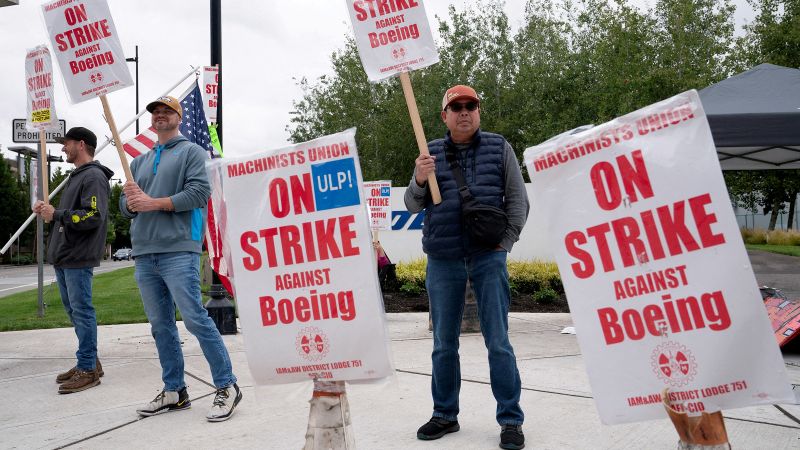Boeing and the union representing 33,000 striking employees have reached an impasse in their negotiations, with no new talks scheduled. Following two days of federally mediated talks, Stephanie Pope, CEO of Boeing’s commercial airplanes unit, stated that the union had made non-negotiable demands that exceed what the company can accept to remain competitive. As a result, further negotiations have been halted, and Boeing’s offer has been withdrawn. The strike, which began on September 13, has caused a halt in the company’s operations and is estimated to be costing Boeing $1 billion per month, according to credit analysts at Standard & Poor’s.
The International Association of Machinists, representing the striking workers, blames Boeing for not presenting an offer that would be acceptable to its members. A previous tentative agreement, rejected by members prior to the strike, would have provided raises totaling 25% over four years. Despite an improved offer by Boeing two weeks ago, which included an immediate 12% raise and raises totaling 30% over the contract’s duration, the union states that this offer was still not satisfactory to its members. The union’s negotiating committee made efforts to address various priorities in hopes of reaching an agreement that could be put to a vote, but Boeing was reportedly unwilling to move in their direction.
Both Boeing and the union expressed a willingness to return to the negotiating table despite the breakdown in talks. The situation remains fluid as a developing story, with updates expected as the situation progresses. The outcome of these negotiations will have significant implications for both the striking workers and Boeing as they seek to find a resolution that is acceptable to all parties involved. The impact of the strike on the company’s operations, financial health, and reputation underscores the importance of reaching a mutually beneficial agreement for both Boeing and the union members.
The strike by the union members has underscored the challenges Boeing faces in balancing the need to remain competitive in the industry while also meeting the demands of its workforce. The rejection of previous offers and the continued disagreement between the two parties highlight the complex nature of labor negotiations in a highly competitive and challenging business environment. Both Boeing and the union must navigate these challenges carefully to ensure a fair and equitable resolution that meets the needs of both parties involved. The willingness to return to the negotiating table demonstrates a commitment to finding a solution that addresses the concerns of both the company and its employees, but the ultimate outcome remains uncertain.
The cost of the strike to Boeing, estimated at $1 billion per month, underlines the urgency of reaching a resolution to minimize the financial impact on the company and its stakeholders. The strike has disrupted operations and put pressure on both the company and its workers to find a path forward that is acceptable to all parties involved. As negotiations continue, both sides will need to find common ground and make concessions to reach an agreement that allows Boeing to remain competitive while also meeting the needs of its workforce. The ongoing uncertainty surrounding the strike highlights the importance of effective communication, collaboration, and compromise in resolving labor disputes and ensuring the long-term success and sustainability of the company.













